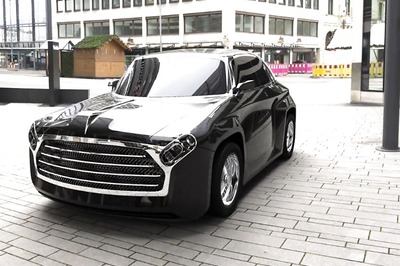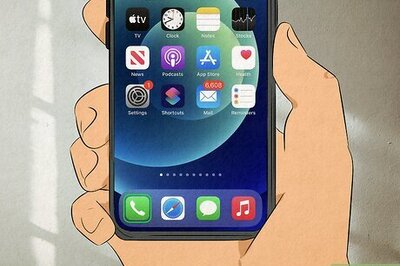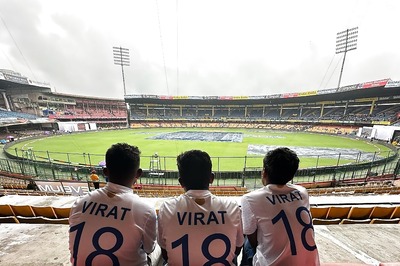
views
New Delhi: He's the best player in the world. He's won every trophy on offer at the club level. He's adored by millions of fans worldwide for the magic he creates on the field. Yet, at the Copa America in his native country earlier this year, Lionel Messi was booed off the pitch by Argentina supporters.
Indeed, the two-time World Player of the Year "has less fans than a referee" in his homeland, according to a 2010 article in the La Nación newspaper. Contrast that with the fanatical frenzy and hysterical excitement that has gripped Kolkata ever since his arrival, and it seems scarcely believable!
Comparisons with Diego Maradona are inevitable, but it isn't as though Argentineans dispute Messi's status as one of the finest-ever footballers after his unprecedented success with Barcelona. However, when it comes to his performances with the national team, the diminutive genius is often criticised for not showing the same spark for his country as for his club. Some have gone as far as to as to call him 'The Catalan', accusing him of not knowing the national anthem and questioning his commitment to Argentina.
The frustration of the supporters is understandable after disappointing quarter-final exits in the 2010 World Cup and the 2011 Copa America, given that Argentina have not won an international trophy since 1993. And, baseless allegations aside, it is true that Messi's performances for the national side have been below-par.
However, the comparisons are being made with his performances for a Barcelona side that has established itself as one of the greatest teams of all time. Messi might be the central figure, but at the Camp Nou he is surrounded by other exceptional players, most of with whom he has been playing since moving to Barcelona at the age of 13.
To question his dedication and loyalty is ridiculous. Messi was the only Argentine, and one of only four players in the entire continent, to play all 18 rounds of South America's 2010 World Cup qualifiers. He won the World Youth Cup in 2005, Olympic Gold in 2008 and reached the Copa America final in 2007.
Yet, Messi has been unable to replicate his club form at the international level. So what's the problem?
Perhaps it is the system Argentina have tried to implement, which has so far failed to allow the 5'7" playmaker to play to his strengths. In the quarter-final defeat to Germany in South Africa, for instance, coach Maradona picked Carlos Tevez ahead of Juan Sebastian Veron, who can play Messi into the game similar to the manner in which Xavi does at Barcelona.
In the Copa America, Maradona's successor Sergio Batista also initially tried to mould his squad to play to Messi's strengths, and failed. However, in their must-win group match against Costa Rica, there were signs that, in the right set-up, Messi can indeed be brilliant even for the national team. With Sergio Aguero on his left and Gonzalo Higuain playing as a centre-forward, Messi gave one of his most dominant performances in an Argentina shirt.
It is unfair to expect the Argentina side to play like Barcelona, even though they have several gifted players. So perhaps the answer lies in trying to find a system of play that can accommodate these talents and still bring the best out of Messi, rather than blindly trying to imitate the Barca formula at the international level.
That is the challenge for new coach Alejandro Sabella, as he takes charge for the first time in Kolkata. Incidentally, the match will also be Messi's first as regular captain of Argentina. Expectations, as always, will be high.
Fans, perhaps unjustly, expect Messi to be able to rise above the team and single-handedly win games for Argentina. After all, the popularly-held belief is that if Maradona could do it, so should Messi. However, even the great Maradona had support from teammates like Jorge Valdano, Jorge Burruchaga, José Luis Brown and Oscar Ruggeri. At Barcelona now, it is the team as a whole, not just individual brilliance, that is behind their consistent success. Messi alone cannot be responsible, neither for Argentina's glory nor failure, even if he is the world's best player.
It is held against Messi that, unlike Pele and Maradona, he is yet to win a big trophy for his country. The Rosario-born wizard has himself admitted that a player needs international success on the big stage to claim legendary status.
However, neither Pele nor Maradona won the Copa America, and the latter was 26 when he starred in the 1986 World Cup. So, at 24 and still in his prime, Messi has enough time yet to collect the missing trophies in his cabinet.
Just because Argentina have not reached similar heights as Barcelona, does not mean Messi is not one of the greatest players of our time. His skill, his talent, his ability and his achievements are astounding, and when in flow, he is virtually unstoppable. He has already assured his place alongside the very best in history. If, however, he also manages a World Cup win in his career, Messi might just end the debate over the greatest footballer of all time.


















Comments
0 comment